Wikipedia talk:WikiProject Microbiology/Archive 5
| This is an archive of past discussions on Wikipedia:WikiProject Microbiology. Do not edit the contents of this page. If you wish to start a new discussion or revive an old one, please do so on the current talk page. |
| Archive 1 | ← | Archive 3 | Archive 4 | Archive 5 | Archive 6 | Archive 7 | → | Archive 10 |
WikiProject Algae
WikiProject Algae was started as a meeting space on Wikipedia for improving the taxonomic representations of the groups of organisms called algae. Please join other editors at the talk page (Wikipedia talk:WikiProject Algae) to discuss a higher level taxonomy for algae to be used on Wikipedia.
The taxonomies used on Wikipedia algae articles are a mixture of ancient to modern random phyla/classes that are often inconsistent from one article to the next (and sometimes within the same sentence of an article). Editors have adopted hypothesized taxonomies from single articles in the literature, taxonomies that have been out of favor for over 100 years, and some taxoboxes use taxonomies from two different sources.
I think that a taxonomy that is supported in tertiary sources (textbooks), with added insight from the technical literature (review articles, well-cited research), could create some order to allow editors with a wide range of knowledge to edit these articles. Please discuss the proposed taxonomy at the project talk page. --68.127.232.132 (talk) 19:38, 11 January 2010 (UTC)
WP 1.0 bot announcement
This message is being sent to each WikiProject that participates in the WP 1.0 assessment system. On Saturday, January 23, 2010, the WP 1.0 bot will be upgraded. Your project does not need to take any action, but the appearance of your project's summary table will change. The upgrade will make many new, optional features available to all WikiProjects. Additional information is available at the WP 1.0 project homepage. — Carl (CBM · talk) 03:36, 22 January 2010 (UTC)
GA reassessment of Yeast
I have conducted a reassessment of the above article as part of the GA Sweeps process. I have found some concerns which you can see at Talk:Yeast/GA1. I have placed the article on hold whilst these are fixed. Thanks. Jezhotwells (talk) 17:02, 14 February 2010 (UTC)
Acetogenesis articles need review
Hello, the articles acetogenesis and acetogen both give only one reaction of acetic acid production, from carbon dioxide and hydrogen. However, it seems to me in nature we often encounter pathways starting from more complicated compounds, such as volatile fatty acids. It would be nice if this could be added to the two articles. I can't do it myself since I don't know the species involved and the precise pathways. Cheers, AxelBoldt (talk) 17:57, 7 March 2010 (UTC)
Editors trying to keep a table which plays down HIV transmission risks
Please comment. See: Talk:HIV#HIV_Risk_Table Phoenix of9 00:57, 25 March 2010 (UTC)
Moraxella osloensis
Hello, feel free to add human medicine details to my first bacteria article Moraxella osloensis to be well balanced for a DYK hook. Thank you. --Snek01 (talk) 00:19, 31 March 2010 (UTC)
- I've made the obvious (somewhat cursory) PubMed search and added some material, but if someone wants to pick it up from here, there's probably more that could be done with modest effort. Kingdon (talk) 02:57, 4 April 2010 (UTC)
Currently an expired prod, listed as an unreferenced dicdef (true) and possible hoax ( I think not). It may be salvageable if anyone has the time. Ben MacDui 19:41, 5 April 2010 (UTC)
- I took a glance and it surely is a real term, but I don't have the knowledge to compare it with other concepts like population. Depending on the situation, discussion of consorms might belong in another article or in its own article. Kingdon (talk) 14:27, 6 April 2010 (UTC)
- I have turned it into a stub article (Consorms). Better something than nothing IMHO. Kind regards, Captain n00dle\Talk 03:42, 11 January 2012 (UTC)
Microscopy illustration
Since microscopy is within your scope, I'm letting you know about this figure that I composed (from previously existing material) that might be useful for illustrating aspects of light and/or electron microscopy. If you need to make changes that will reduce the EV in the three butterfly-related articles where it's currently placed, please create a fork instead. Thank you.
Photographic and light microscopic images 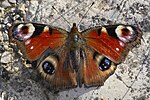

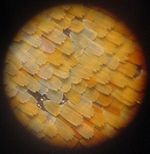
Zoomed-out view of an Aglais io. Closeup of the scales of the same specimen. High magnification of the coloured scales (probably a different species). Electron microscopic images 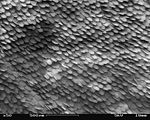
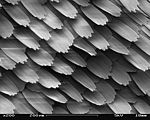

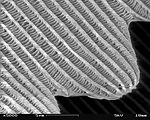
A patch of wing Scales close up A single scale Microstructure of a scale Magnification Approx. ×50 Approx. ×200 ×1000 ×5000
Papa Lima Whiskey (talk) 11:38, 1 May 2010 (UTC)
Mitochondrion Cleanup
I am a reasonably experienced editor, but domain non-expert, interested in the Mitochondrion and related articles. I've been somewhat unsatisfied with the overall article structure for some time and I feel that it needs improving from an editorial rather than content perspective. For example the article has a number of daughter articles (eg. Outer mitochondrial membrane for the section Outer membrane) are based on a clone of content. However there seem to be three main problems:
- The cloned copy has only pulled across the text and not the corresponding references, leaving the daughter page unreferenced.
- Content has been added to the main article, but not the daughter so that the latter is different to the former rather than a superset.
- There are sometimes minor inconsistencies between the two versions.
I propose to clean up some of these, but given my non-expert status, I wanted to alert project members and get feedback before doing so. I will create a discussion and repeat this post on the Talk:Mitochondrion page. I'll leave it a week or so for comment before starting. -- TerryE (talk) 14:39, 4 May 2010 (UTC)
Worm infections
After discovering some worms in cod I caught and was about to eat, I decided to do some googling and found information online suggesting ingestation of round worms can cause chronic human infestation, but our wikipedia article seems to state that this is a self limiting infestation in this article section Anisakis#Treatment stating the human host is a dead end host and that treatment is unnecessary. I then decided to track down the source used and the source does not seem to reflect what the article says but I am not a microbiologist and was not confident in editing the article. I hope I am not troubling the folk here, I just was concerned that our article might be giving out the wrong information. Does the article need correcting, specifically the treatment section?--Literaturegeek | T@1k? 19:26, 7 May 2010 (UTC)
- Definitely worth tracking down that reference; thanks for that. I've taken a stab at revising that paragraph but feel free to WP:Be bold if you find more complete information. I didn't see anything in that abstract about chronic infestations, but perhaps a PubMed search would find something. Kingdon (talk) 20:05, 17 May 2010 (UTC)
Expertise needed for amoeba (?) videos
I just uploaded these two self-made videos to Commons. I'd be grateful if some knowledgeable people from this project could check the titles, captions and categories, and add any more relevant information if possible. I can't do this myself, since I don't know enough about microbiology. If the videos need renaming, I'm happy to file a rename request. Thanks, NotFromUtrecht (talk) 12:39, 10 May 2010 (UTC)
Viral cleanup
I've noticed a number of virus pages with a taxobox that places them in the animal kingdom, probably because the editor who placed the boxes misunderstoof their purpose. However, my knowledge of viruses is limited to the extend that I cannot correct the taxoboxes and properly incorporate the material without likely losing some important information. Could someone help cleanup the viral items appearing here? --EncycloPetey (talk) 06:07, 7 June 2010 (UTC)
- Lentivirus and Cucumovirus look OK already. I cleaned up Vesivirus, Lagovirus, and Vesicular exanthema of swine virus by copying virus_group from the family and deleting all the animal taxa from the taxobox. Those entries were apparently a (failed) attempt to identify the hosts, but that seems to already be covered in the body of the articles (and can be added easily enough later if there is anything missing on the point). Kingdon (talk) 16:11, 13 June 2010 (UTC)
I was surprised to see that there was no Wikipedia article on this, so I created it today. I would appreciate your assistance in expanding it with the relevant taxobox, references and further information. Thanks. Axl ¤ [Talk] 10:57, 30 June 2010 (UTC)
Microbiology articles have been selected for the Wikipedia 0.8 release
Version 0.8 is a collection of Wikipedia articles selected by the Wikipedia 1.0 team for offline release on USB key, DVD and mobile phone. Articles were selected based on their assessed importance and quality, then article versions (revisionIDs) were chosen for trustworthiness (freedom from vandalism) using an adaptation of the WikiTrust algorithm.
We would like to ask you to review the Microbiology articles and revisionIDs we have chosen. Selected articles are marked with a diamond symbol (♦) to the right of each article, and this symbol links to the selected version of each article. If you believe we have included or excluded articles inappropriately, please contact us at Wikipedia talk:Version 0.8 with the details. You may wish to look at your WikiProject's articles with cleanup tags and try to improve any that need work; if you do, please give us the new revisionID at Wikipedia talk:Version 0.8. We would like to complete this consultation period by midnight UTC on Monday, October 11th.
We have greatly streamlined the process since the Version 0.7 release, so we aim to have the collection ready for distribution by the end of October, 2010. As a result, we are planning to distribute the collection much more widely, while continuing to work with groups such as One Laptop per Child and Wikipedia for Schools to extend the reach of Wikipedia worldwide. Please help us, with your WikiProject's feedback!
For the Wikipedia 1.0 editorial team, SelectionBot 23:20, 19 September 2010 (UTC)
Undescribed organisms
How should organisms that do not yet have a valid description be handled in Wikipedia? For example, should they have a taxobox? --RockMagnetist (talk) 16:30, 29 September 2010 (UTC)
- In some cases, we don't give them their own article, but just mention them in a larger article (the only example I'm finding right now is "some DNA sequences which were found in marine environments but not identified with known organisms" at Calkinsia but I think there are at least a few others). In other cases they have an article (although I'm not sure whether this is really a good idea), for example, Nemacheilus sp. nov. or Rhus sp. nov. A. Did you have a specific example in mind? The best approach might depend on things like what is known about the organism. Kingdon (talk) 01:10, 8 October 2010 (UTC)
- The organism, according to a publication in 2009 is "presently in the process of valid description as Magnetococcus marinus". Under the name Magnetococcus strain MC-1, it has been the subject of quite a few publications, so a lot is known about it.--RockMagnetist (talk) 03:06, 8 October 2010 (UTC)
- I guess I'd put it at Magnetococcus strain MC-1 and give it a taxobox. I'm always a bit reluctant to use names (at least, as article titles) before they are published. Granted, I edit more eukaryote articles than bacteria ones, but I'm not sure the differences in bacterial nomenclature affect what to call the article or whether it should have a taxobox. Kingdon (talk) 16:02, 11 October 2010 (UTC)
- Your solution sounds like a good one. If the official name comes through, Magnetococcus strain MC-1 could become a redirect for anyone who has encountered the name in the earlier literature. Thanks! --RockMagnetist (talk) 17:41, 11 October 2010 (UTC)
AfD on segmented filamentous bacteria
You may wish to comment at Wikipedia:Articles for deletion/Segmented Filamentous Bacteria. Smartse (talk) 18:03, 29 October 2010 (UTC)
Microbiology banner on bacteria and plasmodium talk pages
I would like to add the WP:Microbiology banner to bacteria (although not cyanobacteria), non-algal "protist," and plasmodium talk pages.
The wikiproject prokaryotes and protists is not active. This project would be a great place to monitor articles in these areas, there are tons of mycobacterial stubs, for example.
--Kleopatra (talk) 08:21, 5 November 2010 (UTC)
Porins and LPS
Hi guys,
It would be great if you could take a look at Wikipedia:Articles for deletion/Porins and LPS. Ka Faraq Gatri (talk) 12:36, 6 November 2010 (UTC)
Divergence of bacteria and archaea
Can somebody take a look at Talk:Bacteria#Origin_and_early_evolution, where a newbie has pointed out an error in the bacteria article? I've hidden the section in the article from view for the moment, as I wasn't sure how I could correct it myself. Reference 17 in Timeline_of_evolution#Archean_Eon may be of use, but I'm not sure. Cheers SmartSE (talk) 21:27, 10 November 2010 (UTC)
Hi
hi ineed to no what is different between plate count agar and nutrient agar,and can i use anutrient agar to determin atotal bacterial cont. — Preceding unsigned comment added by 41.209.68.206 (talk • contribs) 06:53, 13 February 2011
Possible copyright problem around Mycobacterium
I recently came across the article Mycobacterium houstonense, and noticed that almost all its content was ripped verbatim from the source it cited (doi:10.1099/ijs.0.02743-0). I deleted the plagiarised parts from that article, but a quick scan of related articles suggests that the problem may be rather more widespread, certainly extending across other Mycobacterium species, and possibly more widely still. I have no bacterological expertise, so I was hoping that people from this project would be able to investigate the matter. Thanks. --Stemonitis (talk) 08:11, 11 November 2010 (UTC)
- Looks like the (non-active since 2007) user responsible for the copyright vio created ~91 species articles in the Mycobacterium genus. For what it's worth Mycobacterium immunogenum looks to be copyright vio free. I've removed copyright vios from Mycobacterium pinnipedii and Mycobacterium palustre. I'll try and check some more articles later on. The sources are there for re-writing the articles should anyone feel like it. Ka Faraq Gatri (talk) 10:57, 11 November 2010 (UTC)
- (I should also add, I've no particular bacterial expertise either but this is, as Stemonitis says, a cut and paste job) Ka Faraq Gatri (talk) 11:00, 11 November 2010 (UTC)
Marteilia
Hi again,
A user has requested feedback on their formatting work of the genus article Marteilia over at Wikipedia talk:WikiProject Molecular and Cellular Biology#Marteilia. The formatting looks good to me, but I have some concerns over the classification of this genus. Could someone who knows about protist classification take a look and comment? Thanks Ka Faraq Gatri (talk) 01:02, 13 November 2010 (UTC)
Reactivation of WikiProject Veterinary Medicine
I am interested in re-activating WikiProject Veterinary Medicine, particularly when I saw another user recently post this same idea on the project page. If you're interested and/or you have a great idea for jump-starting the revitalization, stop by here. --Kleopatra (talk) 02:34, 27 November 2010 (UTC)
"Biotype"
I note that the article Vibrio cholerae refers to "biotype", which is currently a redlink. I see that 48 other articles also use the term "biotype", and many are about topics other than microbiology.
- Do we want to create a stub biotype?
- Do we want to change "biotype" in Vibrio cholerae and other microbiology-related articles to "serotype"? (Or is this wrong?)
-- 187.67.203.186 (talk) 04:08, 30 November 2010 (UTC)
Biotype and serotype are different things. In microbiology, biotype appears refer to groups of bacterial strains that can be grouped according to various metabolic properties. I'm not sure how standardized usage is across communities of researchers working on different bacterial species. Serotype refers to the immunological properties of different strains -- whether antisera is cross-reactive or not.
Lieandswell (talk) 02:41, 24 November 2011 (UTC)
List of unusual prokaryotes
Seeing the interest in GFAJ-1, I am very much tempted to make a page describing/listing unusual bacteria (Hodgkinia cicadicola and Carsonella ruddii, Pelagibacter ubique, Thermococcus gammatolerans and Deinococcus radiodurans,Geogemma barossii (aka. Strain 121) and Methanopyrus kandleri, Solibacter usitatus, Zymomonas mobilis, "Mycoplasma laboratorium" and so forth), which would be loved by many readers, but hated by deletionists as it is not a very encyclopedic entry (as it is arbitrary). Anyone think it is a good idea and if so any suggestions? --Squidonius (talk) 01:47, 4 December 2010 (UTC)
- It would be interesting, but what argument will you use at the inevitable AFD to justify its existence? How does one define "unusual"? Sasata (talk) 03:53, 4 December 2010 (UTC)
- If one is a wikipedia editor, one doesn't define "unusual." One finds a source that defines "unusual," then finds multiple sources that define and name unusual bacteria.
- If by arbitrary you mean, editors just pick which species they think are unusual, then it's Original Research and your personal opinion. --Kleopatra (talk) 05:53, 4 December 2010 (UTC)
- Yes, that is why I asked the question. There is the information already in wikipedia, e.i. each of those species (bar the red links) has a page, but there is a lot of other information, so a navigation page for people who are surfing wikipedia to find something interesting is not a bad idea per se, hence I bothered asking for opinions in the first place. One possibility, is that NCBI has a detailed list of 1000+ sequenced genomes, some commonly known species such as Thermus aquaticus (draft though) or the Halomonas sp. GFAJ1 are not there, but many pathogens, phylogenetically interesting (GEBA project), extremophiles and minimal genomes are there and many species are duplicates. --Squidonius (talk) 11:34, 4 December 2010 (UTC)
- How about lists of minimal genome species, tied to references describing the size of a minimal genome and etc.? --Kleopatra (talk) 01:58, 10 December 2010 (UTC)
- The minimal genome project page (unfortunately called Mycoplasma laboratorium!!) already has a list of 10 or so species with genomes smaller than mycoplasma genitalium. I can find out which species are most looked at in wikipedia, but that list is a bit arbitrary (if anyone wants it done just say so). I was hoping for a reference which listed the weird stuff, but it does not seem to exist, which answers my first question. --Squidonius (talk) 05:56, 10 December 2010 (UTC)
- Probably need more than one such list to justify the article. By the way, the question is not silly--it shows you're thinking of the reader. --Kleopatra (talk) 06:23, 10 December 2010 (UTC)
- The minimal genome project page (unfortunately called Mycoplasma laboratorium!!) already has a list of 10 or so species with genomes smaller than mycoplasma genitalium. I can find out which species are most looked at in wikipedia, but that list is a bit arbitrary (if anyone wants it done just say so). I was hoping for a reference which listed the weird stuff, but it does not seem to exist, which answers my first question. --Squidonius (talk) 05:56, 10 December 2010 (UTC)
- How about lists of minimal genome species, tied to references describing the size of a minimal genome and etc.? --Kleopatra (talk) 01:58, 10 December 2010 (UTC)
- Yes, that is why I asked the question. There is the information already in wikipedia, e.i. each of those species (bar the red links) has a page, but there is a lot of other information, so a navigation page for people who are surfing wikipedia to find something interesting is not a bad idea per se, hence I bothered asking for opinions in the first place. One possibility, is that NCBI has a detailed list of 1000+ sequenced genomes, some commonly known species such as Thermus aquaticus (draft though) or the Halomonas sp. GFAJ1 are not there, but many pathogens, phylogenetically interesting (GEBA project), extremophiles and minimal genomes are there and many species are duplicates. --Squidonius (talk) 11:34, 4 December 2010 (UTC)







